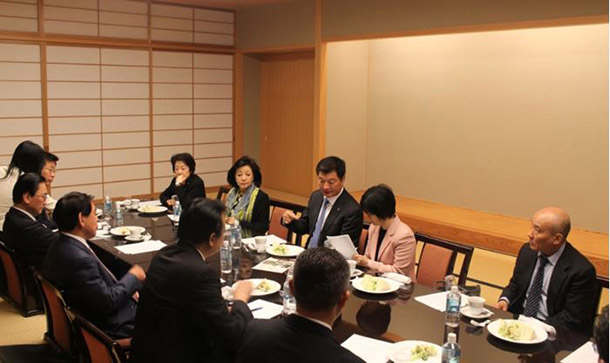Tokyo, Japan — Issuing a statement expressing support for the Middle Way Policy, the All Party Japanese Parliamentary Tibet Support Group strongly criticised the Chinese government’s suppression of the unique culture, education, language and religious freedom in Tibet.
President of the Central Tibetan Administration Dr Lobsang Sangay met with the members of Parliament of the All Party Japanese Parliamentary Tibet Support Group at the Parliament office building in Tokyo, on January 31, 2019, according to the Office of Tibet, Japan.
During the hour-long meeting, President Dr Sangay apprised the Japanese parliamentarians on the situation in Tibet and support from the international community for the Tibetan cause including the Reciprocal Access to Tibet Act of 2018 and Indo-Pacific Reassurance Act of the Donald Trump’s administration.
The All Party Japanese Parliamentary Tibet Support Group issued a statement expressing support for the Middle Way Policy to seek genuine autonomy for the Tibetan people within the framework of the Chinese constitution. They strongly criticised the Chinese government’s suppression of the unique culture, education, language and religious freedom in Tibet.
The meeting was attended by executive members of All Party Japanese Parliamentary Tibet Support Group including Chairman Shimomura Hakubun, former education minister, Liberal Democratic Party; Watanabe Shu, Vice Chairman, Party of Hope, Yamatani Eriko, Liberal Democratic Party, Furuya Keiji, Liberal Democratic Party, Seichi Eto, Liberal Democratic, Baba Nobuyuki, Japan Innovation Party, Nagao Takashi, Liberal Democratic Party and Sakurai Yoshiko, a veteran journalist and head of think tank, Japan Institute of National Fundamentals.
The President was accompanied by Lungtok, the Representative of His Holiness the Dalai Lama, the Office of Tibet and Secretary Lobsang Choedak during the meeting.
The Chinese Communist totalitarian regime began their invasion of Tibet in 1949, reaching complete occupation of the country in 1959. Since that time, more than 1.2 million people, 20% of the nation's population of six million, have died as a direct result of China's invasion and occupation. In addition, over 99% of Tibet's six thousand religious monasteries, temples, and shrines, have been looted or decimated resulting in the destruction of hundreds of thousands of sacred Buddhist scriptures.


![Tibet has a rich history as a sovereign nation until the 1950s when it was invaded by China. [Photo: File]](/images/stories/Pics-2024/March/Tibet-Nation-1940s.jpg#joomlaImage://local-images/stories/Pics-2024/March/Tibet-Nation-1940s.jpg?width=1489&height=878)
















